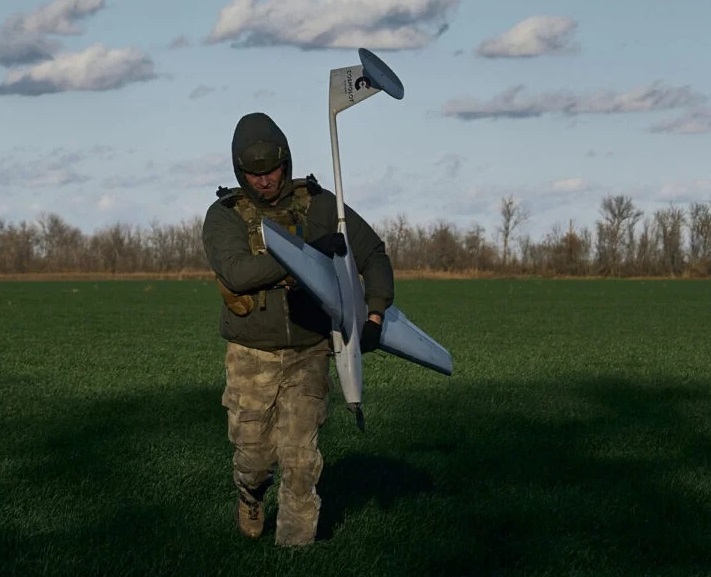| ‘They’re also learning’: Russia, Ukraine race to out-innovate each other
“他们也在学习”:俄罗斯和乌克兰竞相创新 Date:2023-12-16 Source:breakingdefense By:SYDNEY J. FREEDBERG J Viewed: |
Tactics and technology advance so fast that a drone that’s cutting-edge today will be obsolescent in two months, Ukrainian and NATO officers say.
乌克兰和北约官员表示,战术和技术进步如此之快,以至于今天最先进的无人机将在两个月内报废。
By SYDNEY J. FREEDBERG JR.
on December 14, 2023
作者:悉尼J.弗里德伯格JR
2023年12月14日

Ukrainian military operate a Punisher drone, a small fixed-wing reusable aircraft used by frontline infantry to strike military targets, on November 7, 2023 near Vuhledar, Ukraine. (Photo by Kostya Liberov/ Libkos via Getty Images)
2023年11月7日,乌克兰军方在乌克兰武勒达尔附近操作一架“惩罚者”无人机,这是一种小型固定翼可重复使用的飞机,前线步兵用来打击军事目标。(Kostya Liberov/Libkos来自盖蒂图片社拍摄)
AOC 2023 — The visible front line has hardly moved in months, but above the trenches and minefields dividing Ukraine, an invisible battle rages back and forth in the airwaves.
AOC 2023——可以看到的俄乌前线几个月来几乎没有变动,但在分割乌克兰的战壕和雷区上方,一场无形的战斗在电波中来回肆虐。
Both sides are constantly updating their drones and their anti-drone tactics, which depend above all else on the radio connections used to control the unmanned aircraft and to relay the vital intelligence they collect to commanders, artillery batteries and missile launchers. Both sides have invested heavily in radio-frequency jamming and deception — electronic warfare — to misdirect missiles and bring down drones, with Ukraine alone losing an estimated five to ten thousand every month. And this cat-and-mouse game moves so rapidly, Ukrainian and NATO experts said at the Association of Old Crows’ annual electronic warfare conference, that tech needs to be upgraded about every eight weeks.
双方都在不断更新无人机和反无人机战术,这首先取决于用于控制无人驾驶飞机的无线电连接,并将他们收集的重要情报传递给指挥官、炮兵连和导弹发射器。双方都在射频干扰和欺骗(电子战)方面投入了大量资金,以误导导弹并击落无人机,仅乌克兰一国每月就损失约5至1万架。乌克兰和北约专家在老乌鸦协会的年度电子战会议上表示,这种猫捉老鼠的游戏发展如此之快,大约每八周就需要升级一次技术。
“The electromagnetic environment in the eastern Donbas is the most complex in the world,” said Air Commodore Blythe Crawford, commandant of the Royal Air Force’s Air & Space Warfare Centre (ASWC). “If you’re turning out version 1.1, you’ve got eight weeks before you churn out version 1.2.”
“顿巴斯东部的电磁环境是世界上最复杂的,”英国皇家空军航空航天作战中心(ASWC)指挥官、空军准将布莱斯·克劳福德说。“如果你要推出1.1版,你还有八周的时间才能推出1.2版。”
A Ukrainian reserve officer and tech entrepreneur, Capt. Iaroslav Kalinin, made the same point more bluntly as he whipped through a presentation of different drone types the two sides had fielded one after another. “Whatever I show you becomes obsolete in the next two months,” Kalinin told the AOC conference.
乌克兰预备役军官和科技企业家亚罗斯拉夫·加里宁上尉在简要介绍双方相继部署的不同无人机类型时,更直言不讳地表达了同样的观点。加里宁在AOC会议上表示:“无论我向你展示什么,在接下来的两个月里都会过时。”
Big, purpose-built military drones like the Turkish Bayraktar TB2 that were stars at the start of the war have given way to hobbyist mini-drones and, increasingly, racing drones controlled by operators using VR goggles to get a drone’s-eye-view — what’s called “First Person View” (FPV) control.
像土耳其“旗手”TB2这样专门制造的大型军用无人机在战争开始时是明星,现在已经让位于业余爱好者的迷你无人机,越来越多的无人机由操作员使用VR护目镜控制,以获得无人机的视角,即所谓的“第一人称视角”(FPV)控制。
Both sides have turned the agile, speedy FPV drones into ad hoc smart bombs and, Kalinin said, the Ukrainians are now even using them as interceptors to bring down larger Russian drones. Meanwhile, operators are constantly adjusting control frequencies to bypass jamming, changing how they hide from retaliatory strikes — which prioritize drone operators — and extending range by such tricks as relaying the control signal through a secondary drone.
双方都将敏捷、快速的FPV无人机变成了临时智能炸弹,加里宁说,乌克兰人现在甚至使用它们作为拦截器来击落更大的俄罗斯无人机。与此同时,操作人员正在不断调整控制频率,以绕过干扰,改变他们躲避报复性打击的方式——这将优先考虑无人机操作人员——并通过通过二次无人机传递控制信号等技巧来扩大距离。
“The side that prevails will be the side that innovates the quickest,” said Crawford.
克劳福德说:“获胜的一方将是创新最快的一方。”
But which side is that? While the Russians have a well-earned reputation for rigidity, “they’re also learning,” said Maj. Gen. Borys Kremenetskyi, a Ukrainian air force officer currently serving as defense attaché to the US. “They’re adapting [their] tactics.”
但那是哪一边?虽然俄罗斯人以刻板著称,但“他们也在学习,”目前担任乌克兰驻美国的国防武官空军军官鲍里斯·克雷梅涅茨基少将说,“他们正在调整战术。”
In the cyber/electronic warfare domain, the Russians began the war with a knockout blow against the ViaSat communications network on which Ukrainian troops depended, only for Elon Musk’s Starlink to save the day. Starlink has proved remarkably resilient against hacking and jamming. But, Kremenetskyi warned, the Russians learned to look for areas of “mass internet access” and other signs that Starlink terminals were online, then target them.
在网络/电子战领域,俄罗斯人以对乌克兰军队所依赖的ViaSat通信网络的致命一击开始了战争,但埃隆·马斯克的星链拯救了局面。事实证明,星链在抵御黑客攻击和干扰方面具有非凡的弹性。但是,克雷梅涅茨基警告说,俄罗斯人学会了寻找“大规模互联网接入”的地区和其他星链终端在线的迹象,然后将其作为目标。
“We transferred a lot of authorities to junior officers,” the general said. “We created a very powerful non-commissioned officers corps, which allows us to make decisions in trenches. Our soldiers do not wait for a general somewhere in headquarters. …They can use their own initiative on the battlefield. That is one of our advantages.”
这位将军说:“我们把很多权力移交给了下级军官。”。“我们组建了一支非常强大的士官部队,使我们能够在战壕中做出决定。我们的士兵不会在总部某处等待将军……他们可以在战场上发挥自己的主动权。这是我们的优势之一。”
Those tactical and technical reforms made a particular difference in electronic warfare: Russian jamming paralyzed Ukrainian command systems in 2014, but failed to bring them down in 2022.
这些战术和技术改革对电子战产生了特别的影响:俄罗斯的干扰在2014年瘫痪了乌克兰的指挥系统,但在2022年未能将其摧毁。
“The biggest boogeyman in the world was Russian EW,” said Jeff Fischer, a former US Air Force electronic warfare officer. “[People said] ‘they’re light years ahead of us.’ No, they’re not.”
“世界上最大的怪物是俄罗斯电子战,”前美国空军电子战官员杰夫·费舍尔说。“(人们说)‘他们比我们早了光年。’不,他们不是。”
Sure, he told the AOC conference, the technical specifications of Russian systems were impressive, and specimens acquired by intelligence agencies performed magnificently in field tests on US ranges — where they were operated by US-trained crews with top-notch technical support. In the mud and chaos of actual conflict, however, with patchy maintenance and tired, under-trained crews, their combat performance was much worse.
当然,他在AOC会议上表示,俄罗斯系统的技术规格令人印象深刻,情报机构获得的实物在美国靶场的实地测试中表现出色,这些实物由受过美国训练的操作人员在一流的技术支持下操作。然而,在实际冲突的泥泞和混乱中,由于维护不完善,操作人员们疲惫不堪,训练不足,他们的战斗表现要糟糕得多。
That said, Fischer warned, the brutal natural selection of ongoing combat is forcing even the Russians to get better. “I will say, even though Russia wasn’t great at the beginning, fighting is training, so they might be losing guys but they’re learning,” he said. “Russia’s getting actually relatively good, only because they’re being forced to do so.”
尽管如此,菲舍尔警告说,持续战斗的残酷自然选择甚至迫使俄罗斯人变得更好。他说:“我要说的是,尽管俄罗斯一开始并不出色,但战斗就是训练,所以他们可能会失去球员,但他们正在学习”,“俄罗斯实际上变得相对不错,只是因为他们被迫这么做。”
上一篇:Ukraine continues to snap up Chinese DJI drones for its defense 下一篇:The US needs more munitions to deter China
| The Booker dilemma: inside US Army transformation
“布克”困境:美国陆军转型内幕 |
| The decision to cancel the M10 Booker light tank is at the core of a reordering of US Army planning.... [2025-07-16] |
| Focus: A fragile balance in Asia, China has become leading military power in the
焦点:亚洲平衡脆弱,中国已成为该地区的主要军事力量 |
| However, China's rapid military growth in this area is tipping the balance in favor of regional power. ... [2024-08-27] |
| Small drones will soon lose combat advantage, French Army chief says
法国陆军总司令表示,小型无人机将很快失去战斗优势 |
| By Rudy Ruitenberg Thursday, Jun 20, 2024 作者:鲁迪瑞滕伯格 2024年6月20日星期四 French Army Chief of Staff Gen. Pierre Schill inspecting a Rapid Eagle anti-drone system at the Eurosatory defense show in Paris on June 19, 202... [2024-08-18] |
| What’s next for Ukraine’s incursion into Russia?
乌克兰入侵俄罗斯的下一步是什么? |
| Ukraine’s forces have surprised us all with its recent incursion into Russia’s Kursk Oblast since the operation to turn the tide of the war,... [2024-08-17] |
